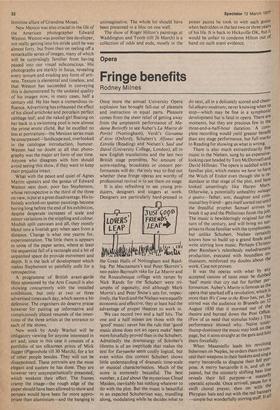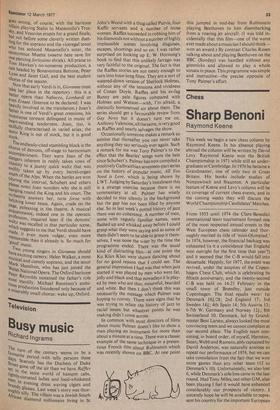Opera
Fringe benefits
Rodney Milnes
Once more the annual University Opera explosion has brought fall-out of pleasure and instruction in equal parts. Pleasure comes from the sheer relief of getting away from the umpteenth performance of Madama Butterfly to see Auber's La Muette de Portici (Nottingham), Verdi's Giovanna d' Arco (Oxford), Schubert's Alfonso and Estrella (Reading) and Nielsen's Saul and David (University College, London), all in new English translations and the last two British stage premieres. No amount of score-reading, broadcasts or concert performances will do: the only way to find out whether these fringe operas are worthy of professional revival is to see them on stage.
It is also refreshing to see young producers, designers and singers at work. Designers are particularly hard-pressed in the Great Halls of Nottingham and Reading. Pat Macnamara's and Peter Skerrett's neo-paleo-Bayreuth rake for La Muette and the Rouaultesque collage with ramps by Nick Rands for the Schubert were triumphs of ingenuity, and although Mark Morris's and Peter Snow's sets for, respectively, the Verdi and the Nielsen were equal ly economic and effective, they at least had the advantage of proper theatres to work in.
We can record two and a half hits. The one and a half misses are those with the 'good' music: never has the rule that 'good music alone does not an opera make' been more forcefully proved than in the Schubert. Admittedly the dramaturgy of Schober's libretto is of an ineptitude that makes the text for Euryanthe seem coolly logical, but even within this context Schubert shows little understanding of dramatic time-scale or musical characterisation. Much of the score is extremely beautiful. The best number, a Lied about the mysterious Cloud Maiden, inevitably has nothing whatever to do with the plot. But the music is beautiful in an expected Schubertian way, trundling along, modulating while he decides what to do next, all in a delicately scored and cheerful allegro moderato, never knowing when to stop—which may be fine in a symphonic development but is fatal in opera. There are moments, but they are precious few in the three-and-a-half-hour duration. A complete recording would yield greater benefit than any stage performance, but full marks to Reading for showing us what is wrong.
There is also much extraordinarily fine music in the Nielsen, sung by an expensivelooking cast headed by Tom McDonnell and David Hillman. The opera is saddled with a familiar plot, which means we have to have the Witch of Endor even though she is redundant at that stage of the plot, and here looked unsettlingly like Harpo
Otherwise, a potentially unhealthy menage
quatre— father, son, daughter and corn' munal boy friend—gets itself sorted out until the dreadful prophet Samuel arrives to break it up and the Philistines finish the job. The music is bewilderingly original for the turn of the century, and will bring no surprises to those familiar with the symphonies, but unlike Schubert, Nielsen certainlY knows how to build up a grand finale and write stirring love music. Perhaps Christopher Renshaw's relentlessly melodramatic production, executed with boundless enthusiasm, reinforced my doubts about the work. Case not proven. It was the operas with what by anY accepted canons of taste must be dubbed 'bad' music that cry out for further Performances. Auber's Muette is famous as the opera that sparked off a revolution, which is more than We Come to the River has, yet. So stirred was the audience in Brussels on 12 August 1830 that it stormed out of the theatre and burned down the Post Office. (Few of us need that stimulus today.) The performance showed why. Naive tonicthump-dominant the music may look on the page, but it aims straight at the guts and hits them forcefully: When Masaniello leads his revolting fishermen on Naples, he orders them to conceal their weapons in their baskets and sing 3 merry barcarolle to disguise their fell purpose. A merry barcarolle it is, and oft repeated, but the sinisterly shifting bass brie reveals their fell purpose—a master .7 operatic episode. Once arrived, pause for a swift choral prayer, then on with the Phrygian hats and out with the red bannersi —simple but wonderfully stirring stuff. It al goes wrong, of course, with the baritone villain playing Stalin to Masaniello's Trotsky, and Vesuvius erupts for a grand finale, but not before some cleverly written duetting for the soprano and the viceregal tenor who has seduced Masaniello's sister, the eponymous Muette (muette here save for One piercing fortissimo shriek). All praise to Tont Hawkes's no-nonsense production, a east headed by Bonaventura Bottone, Peter I-Yon and Janet Gail, and the best student Chorus of the season. Now that early Verdi is in, Giovanna must take her place in the repertory : this is a better opera than Nabucco, Lombardi or even Ernani. (Interest to be declared: I was heavily involved in the translation.) Joan's father is one of Verdi's great creations, his incestuous torment delineated in music of heart-rending tenderness. Joan, too, is s,kilfullY characterised in varied arias; the tenor King is out of stock, but it is good stock.
, The endlessly-cited stumbling block is the chorus of demons, off-stage to harmonium 4,ccompaniment. They warn Joan of the dangers inherent in rashly taken vows of Chastity to a jaunty quick waltz that was swiftly taken up by every barrel-organ south of the Alps. When the battles are won (during the interval, Schubert and others Please note) Joan wonders why she is still hanging round the King and his court. The o. rchestra answers her, tutta forza with belching lower brass. Again, crude on the Page, poleaxing in the theatre. A musical acquaintance, indeed one in the operatic Profession, inquired later if the demons' waltz was recalled in that particular scene, Which suggests to me that Verdi should have inade it even more vulgar, even more ,inemorable than it already is. So much for good' music. Tvvo young singers in Giovanna should have exciting careers: Helen Walker, a most
musical and comely soprano, and the tenor
1:lark Hamilton, who has just joined the Welsh National Opera. The Oxford baritone
Peter Reynolds sustained the father's role most sturdily. Michael Rennison's ambitious production foundered only because of
a
miserably small chorus: wake up, Oxford.







































 Previous page
Previous page